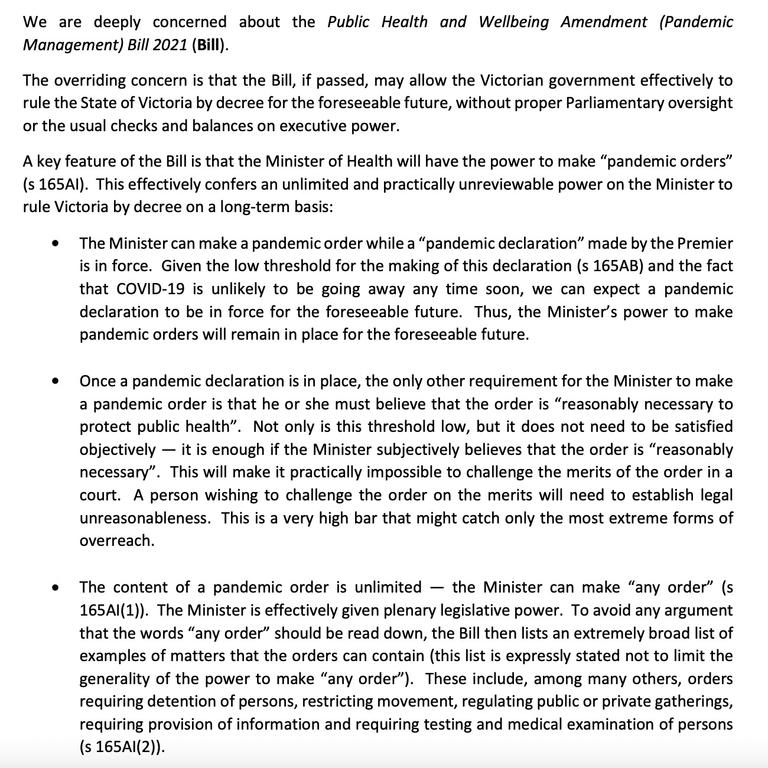Lawyers blast proposed new Victorian pandemic legislation for giving ‘unlimited power’ to state leaders
Leading legal experts in Victoria have slammed Victoria’s proposed pandemic legislation, saying it gives politicians too much power.

A group of leading barristers has lambasted Victoria’s proposed pandemic legislation, deeming the “unlimited power” placed in the hands of the Premier and Health Minister “troubling”.
The laws, introduced to parliament this week, would give the Premier power to declare a pandemic for three months at a time and allow Health Minister Martin Foley to sign off on public health orders without the approval of the chief health officer.
While the Victorian government claimed the new laws would provide a streamlined framework for managing future pandemics, 14 Melbourne QCs have penned an open letter outlining why they strongly disagree.
“The overriding concern is that the bill, if passed, may allow the Victorian government effectively to rule the state of Victoria by decree for the foreseeable future, without proper parliamentary oversight or the usual checks and balances on executive power,” the letter read.
They took particular issue with the key feature of the bill, which would give the Health Minister the “unlimited and practically unreviewable power” to make pandemic orders “on a long-term basis”.

Given Covid-19 is unlikely to go away any time soon, they argued the Premier’s pandemic declaration could be in force for the “foreseeable future”, as well as the Health Minister’s power to issue pandemic orders.
The threshold for the Minister to issue such an order was not only low, they said, but also did not need to meet objective standards.
“It is enough if the Minister subjectively believes that the order is ‘reasonably
necessary’,” they wrote, arguing it would make it practically impossible to challenge the merits of the order in court.
“A person wishing to challenge the order on the merits will need to establish legal
unreasonableness. This is a very high bar that might catch only the most extreme forms of
overreach.”
People could be targeted for ‘political beliefs or activities’
Additionally, they argued it was unreasonable that the Minister be given power to, without question or limits, introduce “any order” they saw fit to protect the broader public’s health.
It was also deemed irresponsible that orders could be enforced “targeting persons
on the basis of their political beliefs or activities”.

Under the laws, this would be permissible if the Minister believed it was “reasonably necessary to protect public health”.
“It is not difficult to imagine how some future health minister might form this view in respect of political beliefs or activities that involve questioning or opposing the government’s public health measures,” the letter read.
In the instance of the merits of a pandemic order being called into question, the letter detailed how difficult it would be for it to be challenged and overthrown.
The Scrutiny of Acts and Regulations Committee (SARC) could take the issue to parliament, but only if the order was “beyond power” or “incompatible with human rights”.
“In reality, parliament’s ability to control the Minister’s power through disallowance is going to be very limited or non-existent,” the letter read.

The lawyers also argued the independent pandemic management advisory committee, which would oversee decisions, was unlikely to hold any “power to rescind or amend the Minister’s orders”.
That was because, according to the QCs, the committee would be entirely made up of people appointed by the Minister himself.
Problem with ‘authorised officers’
The letter also highlighted an issue with giving “extraordinary powers” to predominantly “low-level” authorised officers – for example public servants or people appointed by local councils.
“The bill confers on these authorised officers extraordinary powers, again effectively for the
foreseeable future. If authorised by the CHO, they will be able to, among other things, ‘take
any action or give any direction, other than to detain a person, that the authorised officer
believes is reasonably necessary to protect public health’.”
Such a rule could allow a single authorised officer to shut down a protest if they subjectively believe it to be jeopardising public health, the letter argued.
The group said there were “many other troubling elements” where directives were essentially unreviewable, despite the bill having more “safeguards” than existing emergency powers.
Existing emergency powers – applicable for “very short” periods – were very different to the proposed entrenchment of “rule by decree as a long-term norm”, the group said.
“In our view, this is antithetical to basic democratic principles and should not be allowed to happen,” the letter read.
Health Minister’s powers should be limited
They argued there was “no need to give the government of the day a blank cheque to rule by decree”.
“Instead, the bill should give the minister specific powers to do specific things (such as border closures, lockdowns, mask and vaccination mandates, etc), subject to specific and prescriptive
requirements listed in the bill, and subject to unconditional parliamentary disallowance (i.e. without requiring any SARC recommendation).
More Coverage
“If these powers prove inadequate, the Minister can come back to parliament and seek additional powers. This is how a parliamentary democracy is meant to work.”
The group called on parliament to amend the bill or vote against it.
The legislation passed the Victorian Legislative Assembly on Thursday night, 51 votes to 26. It will be debated in the upper house when parliament resumes on November 16.





